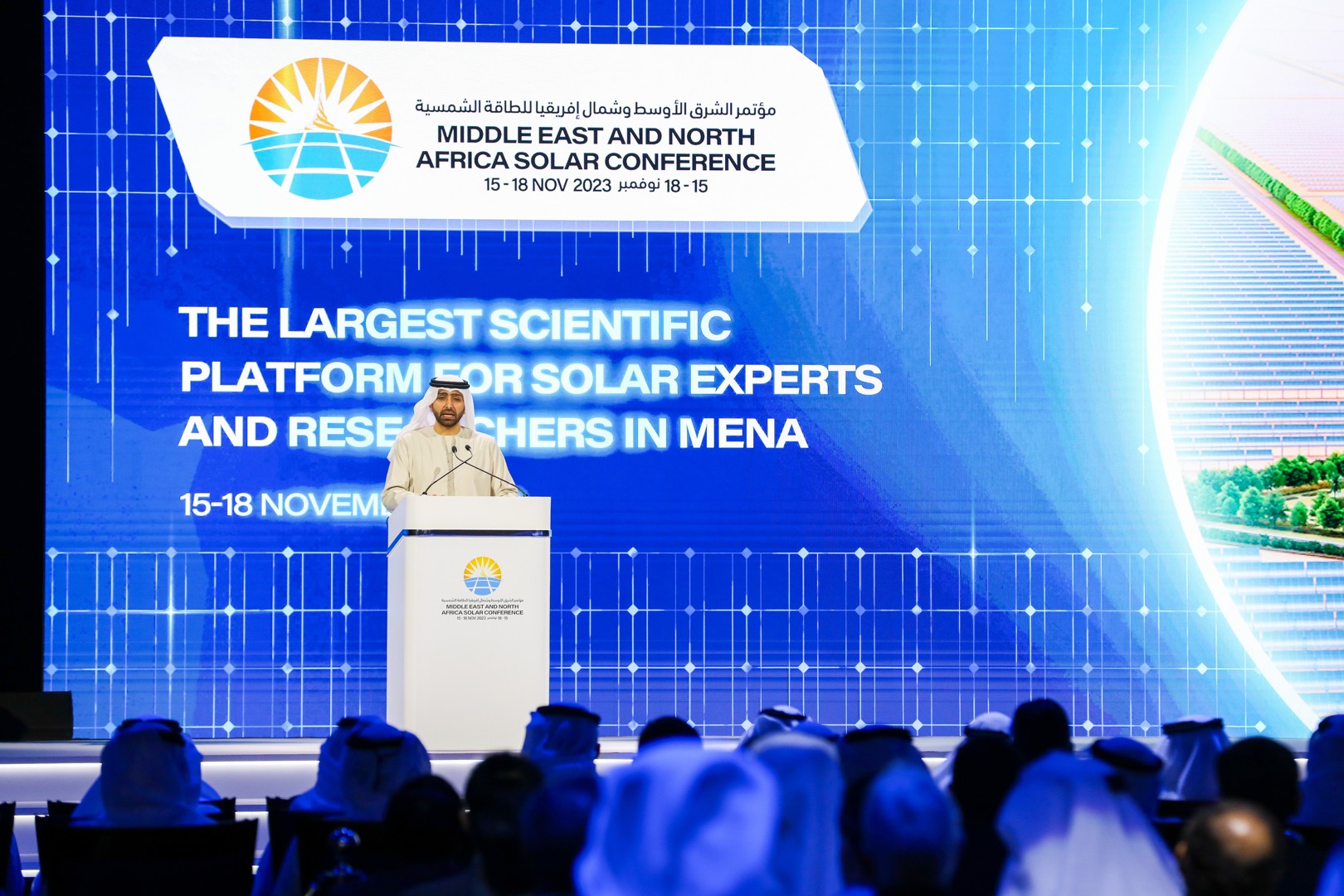- City Fajr Shuruq Duhr Asr Magrib Isha
- Dubai 05:44 07:02 12:29 15:27 17:50 19:08

A lineup of international researchers, scientists and specialists at the first Middle East and North Africa Solar Conference (MENA-SC) 2023, will present the latest scientific and technical progress of organic and organic-inorganic hybrid perovskite cells. They also discuss methods of testing photovoltaic solar panels to ensure their reliability and suitability for the climate and atmosphere of the Middle East and North Africa region, for optimal performance in different climate conditions.
Dubai Electricity and Water Authority (DEWA) is organising MENA-SC from 15 to 18 November 2023 at the Dubai World Trade Centre. The conference is the first scientific and technical conference of its kind in the region, specialising in solar energy systems. It focuses on all areas of photovoltaics with a rich programme on PV materials and devices, future technologies, PV reliability and forecasting for performance assessment. Areas extend to system operation, concentrated solar power and grid integration, all of which are key in accelerating the green energy transformation.
“We strive to achieve the wise directives of His Highness Sheikh Mohammed bin Rashid Al Maktoum, Vice President and Prime Minister of the UAE and Ruler of Dubai, to consolidate Dubai’s global position in renewable and clean energy, and sustainability.
The conference creates additional momentum for the renewable and clean energy sector in the MENA region. This is through encouraging innovation, research, and development; showcasing the latest innovations, research papers, and scientific discoveries in solar energy; and attracting scientists, researchers, investors, and international keynote speakers to exchange knowledge, insights, and discuss breakthrough ideas and the latest innovative technologies and solutions to accelerate the development of solar photovoltaic systems industry, and delivering the expected return on investment for all stakeholders along the value chain,” said HE Saeed Mohammed Al Tayer, MD & CEO of DEWA.
Perovskite and Organic Materials and Solar Cells
The research papers at MENA SC focus on the most prominent scientific and technical progress of perovskite, organic, and hybrid solar cells, which are rising stars for solar cell and optoelectronic applications for its outstanding features. The conference explores the horizons of these emerging PV technologies, which are low-cost, lightweight, flexible, and eco-friendly. They also combine efficiency and stability.
Advancements in Perovskite Materials and Solar Cell Development
The conference highlights the ways of improving the high level of reliability of perovskite solar cells and the major steps that are being taken to increase their durability and stability. It also discusses the fundamental studies on degradation processes at the nanoscale, perovskite module design, module testing, fabrication techniques, process chain evaluation, life cycle assessment, and the rapid progress of organic-inorganic hybrid and fully inorganic halide perovskite solar cells.
Organic and Dye-Sensitised Solar Cells
The scientists, researchers, and experts discuss the development of pure organic solar cells and dye-sensitised solar cells, including material optimisation, the use of fullerene and non-fullerene-based molecules, new charge transport materials and cells designs, as well as solar cell fabrication and testing.
High-Performance Hybrid Tandem/Multijunction Solar Cells
The conference covers experimental and theoretical work on proofs of concept related to developing all-perovskite tandem and multijunction solar cells, device implementation, novel concepts, solar cell fabrication, device testing, and module implementation.
PV Module and System Reliability in the MENA region
MENA SC discusses how to ensure the long-term durability, and reliability of PV systems in harsh weather conditions, how to improve their durability, and needed technologies to overcome soiling and abrasion factors in areas within the Dust Belt and high temperature. This ensures a reliable and effective production of energy.
PV Materials , Module Durability and Accelerated Testing Methods
The conference highlights the latest technologies and practices to reduce the degradation of module and module components when they are subject to high temperatures, thermal cycling, humidity, ultraviolet light, electrical, and mechanical stresses. It focuses on MENA case studies and research related to PV systems operations and maintenance in MENA for optimal performance.
Field Experiences in PV Systems; Reliability Characterisations: Lab and Field Inspection Techniques
The conference covers statistics of types of challenges, data analysis techniques for field data for large-scale and small-scale systems, analysis of mechanisms of observed degradation, electrical and mechanical impacts of failures, degradation rates models, safety and operational studies for PV systems, expected vs. actual field performance, and long-term operation models of PV plants. It also highlights the analysis of field observations from deployments of all PV technologies, methods of analysis of such data, experimental approach and energy yield predictions, best practices and technical/economic insights into operations and maintenance.
Effects and Mitigation of Soiling on PV Systems
MENA SC discusses the major factors in improving PV power plant performance, ground- and satellite-based forecasting of soiling rates, methods for evaluating such rates, cleaning solutions, materials for anti-soiling coatings, soiling mitigation measures, and maintenance plans. It also highlights the studies on the fundamental physics of soiling dust growth and its modelling in PV power plant performance.
Module and System Reliability in the Circular Economy
MENA SC prioritises developing a circular economy for PV modules, components, and systems. It showcases studies and research papers on how to define, quantify, and measure circularity for PV systems and components. It focuses on the role of system reliability and resiliency on circularity, and approaches to extending the useful life such as optimised operations and maintenance, repair, refurbishing, and repowering. It also discusses safety and performance testing of repaired components and systems, and developing circular supply chains to reduce waste at all stages from initial manufacturing through operations.
![]() Follow Emirates 24|7 on Google News.
Follow Emirates 24|7 on Google News.